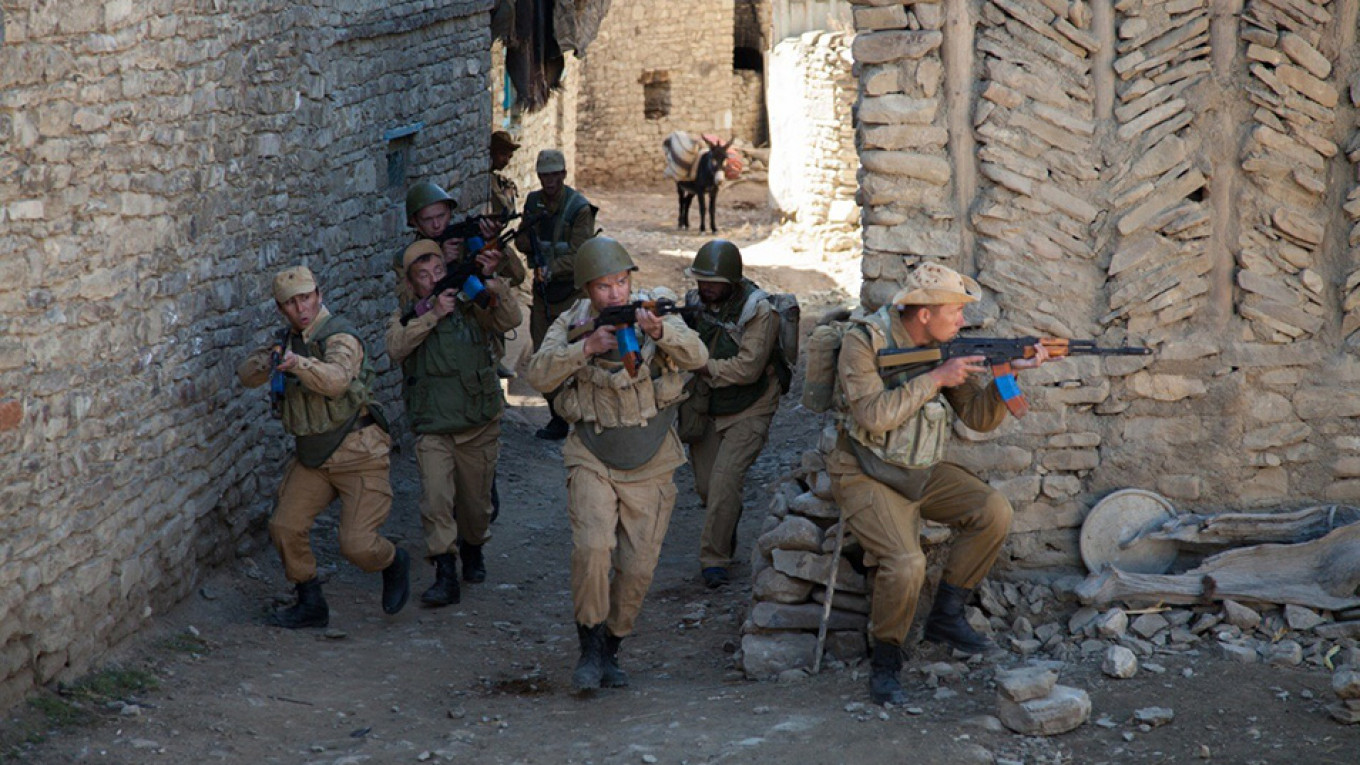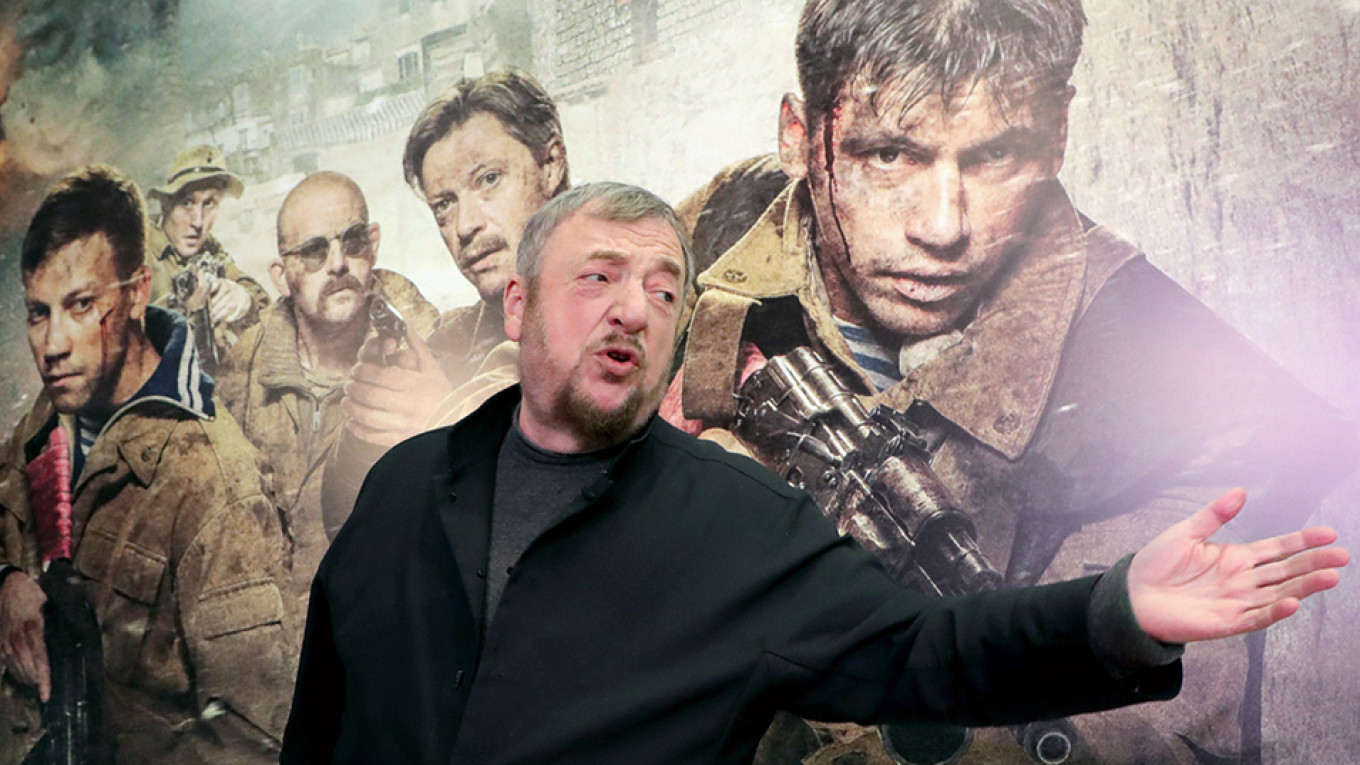By Pjotr Sauer
Director Pavel Lungin.
Outside the Oktyabr cinema in central Moscow a well-dressed crowd lines the red carpet, waiting to catch a glimpse of acclaimed director Pavel Lungin as he enters the building for the premiere of his latest movie, “Bratstvo” (called “Leaving Afghanistan” for distribution abroad).
But inside the auditorium is half empty because the authorities have closed the roads surrounding the city for a rehearsal of the May 9 military parade celebrating the Soviet Union’s victory over Nazi Germany in 1945.
“They are trying to block us any way they can,” Lungin jokes as he takes the stage.

“Bratstvo” (“brotherhood”), based on the memoirs of Afghan war veteran turned FSB spy chief Nikolai Kovalyov, tells the story of the Soviet withdrawal from Afghanistan in 1989. Its realistic portrayal of the last days of the conflict sparked heated discussion after politicians and war veterans slammed its depiction of Red Army soldiers as unpatriotic. Scenes showing soldiers looting and fighting with each other have been particularly controversial.
The campaign against the film has been spearheaded by Igor Morozov, an Afghan veteran and deputy chairman of the Federation Council’s Committee on Science, Education and Culture, who has labeled the movie “a harmful film that twists the history of the Afghan war.”
Morozov is supported by “Battle Brotherhood,” an organization for veterans which has called for the movie to be banned.
Lungin rejects the criticism.
“This is an anti-war movie, not an anti-Russia movie. My main aim was to show how good guys are sent to fight ugly, pointless wars,” he told The Moscow Times.
Lungin added that it is counter-productive to attempt to rewrite the history of the Afghan war.
“I think our society needs to start opening the wounds of war…whether it’s Afghanistan or Chechnya, as the backlash from this movie shows we’re afraid of talking about the truth that Russia wasn’t always the good guy.”
Feb. 15, 2019, marked the 30th anniversary of the Soviet withdrawal of troops from Afghanistan. The nine-year war claimed the lives of more than a million Afghan civilians and over 14,000 Soviet troops.
At the time, Communist Party Secretary General Mikhail Gorbachev’s decision to withdraw the Soviet military from the country was hailed as a long-overdue end to a bloody conflict and the decision to invade was condemned as a mistake by the Congress of People’s Deputies of the Soviet Union. In recent years, however, some Russian politicians have sought to reframe the war as a patriotic success.
Movie critic Andrei Arkhangelsky, who called Lungin’s portrayal of war “the most honest” he has seen in Russian cinema in the last twenty years, said it is this backdrop that has led to the current controversy.
“At a time when the state is trying to oversimplify who the ‘enemy’ is and change the way we understand our history, this movie raises important questions of what patriotism really means. It runs against the black-and-white thinking cultivated in society,” he said.
Some Afghan veterans have also come to the defense of Lungin.
“Morozov does not represent us or other veterans I talked to,” said Valery Shiryayev, a decorated military translator who served in Afghanistan.
Yesenia Kovalyova, the daughter of Kovalyov, the veteran on whose memoirs the movie is based, said the film “was exactly how my father would have wanted it.” Kovalyov died less than two months before the premiere.
Victory Day, has taken on increasing importance in recent years and is accompanied by a state-organized display of patriotism.
“For the authorities, the May 9 celebrations are extremely important and meant to bridge the gap between the sacred victory over Germany and the current leadership,” said political analyst Andrei Kolesnikov.
Cultural commentator Yury Saprykin believes Medinsky was trying to prevent any potential scandal that the movie could trigger.
“In the current climate, a relatively innocent movie can cause a scandal,” Saprykin said.
Despite the furor surrounding “Bratstvo,” on the night of the premiere the members of the Russian political and cultural elite who had managed to make it to the cinema gave the movie a standing ovation.
“We should remember Lungin is very much part of the establishment,” Saprykin said. “He isn’t some sort of marginal opposition director.”
In fact, Lungin is one of Russia’s most decorated directors, whose first film, “Taxi Blues,” won the award for best director at the 1990 Cannes Film Festival. He has directed a number of award-winning films since, including “Luna Park” and “Tsar.” He was also one of a group of artists who signed a letter in support of Russian President Vladimir Putin after Russia’s 2014 annexation of Crimea.
That Lungin came under fire in the first place, speaks volumes about the current climate, said movie critic Arkhangelsky.
“We haven’t reached Soviet-style censorship, but fringe conservative voices feel empowered and are getting a platform trying to get support from the top.”
Veteran Shiryaev agrees, saying some of his former war comrades are hoping to “score cheap political points.”
But perhaps the sober depiction of war in “Bratstvo” will be welcomed by those Russians who are growing weary of years of tub-thumping militarism.
A recent poll showed that Russian support for large-scale military parades decreased in 2019, while a separate poll indicated that the share of Russians supporting Putin’s military intervention in Syria has fallen below 50 percent since August 2017.
For now, Lungin is happy the public will get to see his work. The director believes his movie is timely and sees parallels between the mood among the elites at the end of the Soviet Union and today’s political climate, which has seen a five-year conflict in eastern Ukraine between government forces and Russia-backed separatists.
“In Afghanistan, a part of the Soviet leadership was looking for a way out. They thought a war would fix things back home. I think we ought to really learn from the past that war is not the solution to our domestic problems,” he said.
READ MORE.


